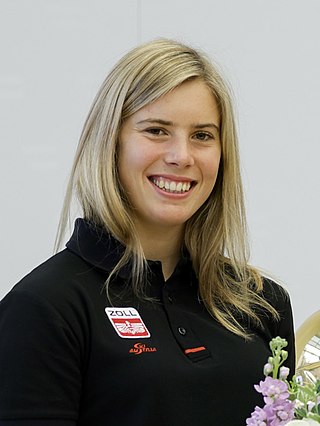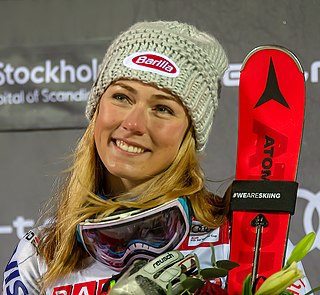
The men's slalom in the 2018 FIS Alpine Skiing World Cup involved 11 events, including two parallel slaloms. The last race, at the World Cup finals in Åre, was cancelled due to high winds.

The International Ski Federation (FIS) Alpine Ski World Cup was the premier circuit for alpine skiing competition. The inaugural season launched in January 1967, and the 2018–19 season marks the 53rd consecutive year for the FIS World Cup.

The men's slalom in the 2021 FIS Alpine Skiing World Cup involved 11 events including the final, exactly as scheduled without any cancellations.

The women's slalom in the 2021 FIS Alpine Skiing World Cup consisted of 9 events, as planned.

The men's giant slalom in the 2020 FIS Alpine Skiing World Cup involved seven events, as the last two scheduled giant slaloms in the season were cancelled.

The men's slalom in the 2020 FIS Alpine Ski World Cup involved only nine events, as the final three scheduled slaloms of the season were cancelled.

The women's slalom in the 2020 Alpine Skiing World Cup involved 6 events, although there were 9 originally scheduled.

The International Ski Federation (FIS) Alpine Ski World Cup was the premier circuit for alpine skiing competition. The inaugural season launched in January 1967, and the 2021–22 season marked the 56th consecutive year for the FIS World Cup.

The men's giant slalom in the 2022 FIS Alpine Skiing World Cup consisted of eight events including the final. At the halfway point of the season, Marco Odermatt of Switzerland had opened a commanding lead in the discipline by winning four of the races and finishing second in the other. The remainder of the season was held in March, after the 2022 Winter Olympics, but in the first post-Olympic event, Odermatt clinched the crystal globe for the season championship.

The men's slalom in the 2022 FIS Alpine Skiing World Cup consisted of ten events including the final. However, the slalom scheduled in Zagreb on 5 January was first delayed until 6 January due to bad weather and then cancelled in the middle of the first run due to additional bad weather, leading to its removal from the schedule. Eventually, however, it was rescheduled for Flachau on 9 March, restoring the season to 10 events.

The women's slalom in the 2019 FIS Alpine Skiing World Cup involved 12 events, including three parallel slaloms. At the end of the season, a new discipline was created for parallel races.

The men's giant slalom in the 2019 FIS Alpine Skiing World Cup involved nine events, including a parallel giant slalom. After this season, all parallel races were moved into a separate discipline. Marcel Hirscher of Austria won three of the first four races this season and easily won the discipline for the fifth straight season, his sixth total win in this discipline, on his way to his eighth straight overall World Cup championship.

The women's slalom in the 2018 FIS Alpine Skiing World Cup involved 12 events, including three parallel races and the season finale in Åre, Sweden.

The men's giant slalom in the 2018 FIS Alpine Skiing World Cup involved eight events, including a parallel giant slalom. Marcel Hirscher of Austria won six of the races this season and easily won the discipline for the fourth straight season, his fifth total win in this discipline, on his way to his seventh straight overall World Cup championship. Hirscher clinched the victory after winning the next-to-last race of the season in Kranjska Gora, Slovenia.

The women's slalom in the 2017 FIS Alpine Skiing World Cup involved 10 events, including one parallel slalom and the season finale in Aspen, Colorado (USA).

The men's giant slalom in the 2017 FIS Alpine Skiing World Cup involved nine events, including the second-ever parallel giant slalom and the season finals in Aspen, Colorado (USA). Marcel Hirscher of Austria won four of the races this season and finished second in four others, easily winning the discipline for the third straight season on his way to his sixth straight overall World Cup championship. Hirscher was so dominant during the season that much of the focus in the news coverage by the end of the season was about his desire to continue, considering the pressure on him to win.

The men's slalom in the 2017 FIS Alpine Skiing World Cup involved 11 events, including one parallel slalom. The last race of the season was at the World Cup finals in Aspen, and Marcel Hirscher of Austria won his fourth championship in the discipline, all in the prior five years, on the way to his sixth straight overall men's championship.

The women's slalom competition in the 2016 FIS Alpine Skiing World Cup involved 11 events, including one parallel slalom and the season finale in St. Moritz, Switzerland.

The men's giant slalom competition in the 2016 FIS Alpine Skiing World Cup involved eleven events, including the first-ever parallel giant slalom and the season finals in St. Moritz, Switzerland. The newly introduced Parallel giant slalom event at Alta Badia, Italy was a relatively short Giant slalom course that pitted the men against one another in a modified bracket-reduction format from a field of thirty-two qualifying skiers, eventually whittled down to just four final-round racers in a "large final" and a "small final".

The men's slalom competition in the 2016 FIS Alpine Skiing World Cup involved 11 events, including one parallel slalom. However, the city event was moved from Munich on 1 January to Stockholm on 23 February due to organization issues. The last race of the season was at the World Cup finals in St. Moritz.











